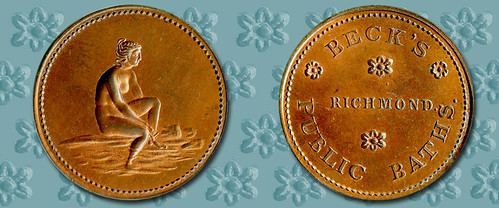
PREV ARTICLE
NEXT ARTICLE
FULL ISSUE
PREV FULL ISSUE
THE BECK’S PUBLIC BATHS TOKENIn a September 29, 2016 Stack's Bowers blog
article, Dave Bowers examines historical trends in collecting and
one ever-popular piece, the Beck’s Public Baths Hard Times Token.
Here's an excerpt. -Editor
 In numismatics some coins, tokens, medals, and paper money issues are popular for one generation and generally ignored by another. These situations, of which there are many, are interesting to contemplate. In the year 1906 many more people collected encased postage stamps than collected Morgan silver dollars by date and mintmark. Today in 2016, or 110 years later, hundreds of thousands of enthusiasts seek Morgan silver dollars from the Carson City, New Orleans, and San Francisco mints, but the number of specialists seeking encased postage stamps aggressively is probably no more than a few dozen. Conversely, in 1988 Gem Mint State silver commemorative coins 1892 to 1954, consisting of 142 different dates and mintmarks of half dollars plus the 1893 Isabella quarter and 1900 Lafayette dollar were hot as firecrackers. Today in 2016 they are in much lower demand, and many MS-65 coins can be purchased for a third or less of the price they brought then. There are some series that are evergreen in popularity. In over 60 years of being a key factor in the rare coin market plus studying numismatic history back to the 18th century (William Bentley, D.D. is the earliest systematic collector of American coins I have located; he obtained Vermont, Connecticut, and other coins as they were issued in the 1780s), I have identified quite a few specialties that have been everlastingly popular. One is copper cents 1793 to 1857. There has never been a time in which a lovely Fine or Very Fine (or whatever grade) 1793 cent has failed to attract enthusiasm. The same thing can be said for colonial and related coins. Such coins as the 1652 Pine Tree shilling have always been in strong demand. The same is true for colonial currency. Ditto for Civil War tokens (the first specialized articles in the first several issues of the American Journal of Numismatics, which made its debut in May 1866, were on Civil War tokens). Beck's Public Baths ... one of the most famous and most desired Hard Times tokens—the copper issued by Beck's Public Baths. In my Guide Book of Hard Times Tokens (Whitman, 2014, now in its second large printing), I listed this as variety W-VA-040. It is also listed as Low-275 and by Russell Rulau in the Standard Catalog of U.S. Tokens 1700-1900 as HTT-441. I estimate the number known as in the 100 range, most of which show some wear. Very Fine and Extremely Fine are typical grades. The finest known is illustrated, the beautiful Mint State coin with most original red color, that I purchased as Lot 3285 in the Dice-Hicks Collection sale, July 2008, for $16,100. The price might seem to be a bit unusual, but if it were a 1794 copper cent of comparable rarity and grade, it would likely sell for 10 times the price! I hasten to say that most Hard Times tokens sell for much less, and beautiful Mint State examples of many varieties can be purchased for a few hundred dollars or less. Some of these are among the most interesting, such as the anti-Jackson tokens of 1837 featuring a jackass and other punny motifs. Back to Beck's: In the period from about 1832 to 1844, when Charles Beck distributed his Beck's Public Baths tokens in Richmond, Virginia, bathing was an occasional experience at best. Houses did not have indoor plumbing, and for most people in the city the closest thing to a bath was wiping with a soapy wet cloth. Across the country, some academies and boarding schools made it an offense to bathe in the colder months, the practice being deemed unhealthy. For those who desired to bathe, public baths were operated in most of the larger cities. If you read the history of the (inexpensive) Hard Times tokens issued by W.A. Handy of Providence, Rhode Island, you will learn that City Baths in 1834 occupied the premises earlier used by Handy for his tailoring and clothing business. Records show that in 1832, Charles Beck was a confectioner and the operator of a bathing facility. The baths were in operation until at least 1844. These tokens, about the size of a quarter dollar, may have circulated locally as currency, or, more likely, they were used as admission checks. The dies are by James Bale or Bale & Smith of New York City. With its somewhat risqué depiction of a nude woman, this token is a favorite today, just as it was with collectors of the mid-19th century when J. Ledyard Hodge sought to obtain some for his collector friends in Philadelphia. If you would like to learn more about tokens in general, also buy or borrow a copy of The 100 Greatest Medals and Tokens, an award-winning book that Kathryn Jaeger and I did for Whitman a few years ago and which is still in print. Also check the Token and Medal Society's website. I was among the founders of this great group more than 50 years ago. To read the complete article, see: THE BOOK BAZARREWayne Homren, Editor The Numismatic Bibliomania Society is a non-profit organization promoting numismatic literature. See our web site at coinbooks.org. To submit items for publication in The E-Sylum, write to the Editor at this address: whomren@gmail.com To subscribe go to: https://my.binhost.com/lists/listinfo/esylum All Rights Reserved. NBS Home Page Contact the NBS webmaster 
|